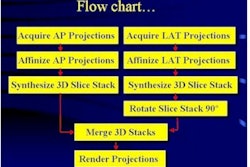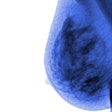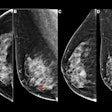Legislation to raise Medicare payments for mammography screening could be introduced in the U.S. Congress as early as next week, according to a spokesman for the bill's principal sponsor, Sen. Tom Harkin (D-IA). The legislation will also address a shortage of qualified mammography technologists.
Reimbursement for screening mammography has become a hot-button issue in the U.S. as low reimbursement, malpractice fears, and a shortage of mammographers and technologists has begun to threaten women's access to mammography services.
And while facilities cope with the financial squeeze, demand for mammography has grown. In 1998 nearly 67% of women over 40 in the U.S. were screened for breast cancer, a significant increase from the 28.7% who underwent screening mammography in 1987, according to Sen. Harkin's office.
The senator is seeking broad bipartisan support for the measure, and is working with Sen. Olympia Snowe (R-ME) and Sen. Barbara Mikulski (D-MD) to develop the final language of the bill.
The spokesman said Tuesday that the office is carefully compiling cost data to ensure that reimbursements proposed in the bill will accurately reflect the cost of providing services. To that end, the bill's introduction has been delayed for a few days while the office waits for additional cost data from the Health Care Financing Administration (HCFA), the Medicare Payment Advisory Commission (MedPAC) and the radiology community, the spokesman said.
Along with higher payments, Sen. Harkin's bill hopes to increase the pool of trained technologists through increased funding of the Allied Health Projects. The program supports continuing education for technologists through the Health Resources and Services Administration, a branch of the U.S. Department of Health and Human Services.
The program has been underfunded since its inception, Harkin's spokesman said.
A recent survey of mammography centers warned of a pending crisis in mammography if Medicare payments rates -- currently about $68 for screening exams and $81 for diagnostic mammography -- continue to fall below the cost of providing services. At a minimum, reimbursement will need to be tripled in order to cover costs adequately, according to survey author Dr. Dieter Enzmann, chairman of the department of radiology at Northwestern University Hospital in Chicago. Enzmann presented the preliminary survey results as part of an ongoing study at the RSNA meeting last November.
In a move that was widely criticized among mammographers, Congress passed legislation in December to raise Medicare payments for digital mammography screening by about half, leaving standard mammography screening rates unchanged. The bill may have had a silver lining, however, in that it moved mammography reimbursement out of the statutory realm and onto the Medicare physician's fee schedule, where payment increases might presumably be easier to accomplish.
However, some mammographers are concerned that the physician's fee schedule might not be ready to provide the substantial increases that will be needed to bring reimbursement in line with the cost of screening services. As a result, Harkin's bill may include some kind of rate floor as a transitional measure, the senator's spokesman said.
For its part, the Reston, VA-based American College of Radiology has put higher screening payments at the top of the year's priorities. According to ACR government relations director Josh Cooper, the organization is taking a wait-and-see attitude about the bill until more details become available.
"It's too early to comment. But we're speaking with Sen. Harkin's office, and they're keeping us updated, and we'll be working with Sen. Harkin and hopefully others in Congress throughout the session," Cooper said. "I think this is more a benchmark bill, just getting it out there and trying to spur some interest the situation, and hopefully gathering some co-sponsors for the bill. Obviously, as with most legislation, what they introduce probably will not end up being what is finally passed."
By Eric BarnesAuntMinnie.com staff writer
February 6, 2001
Related Reading
Higher digital reimbursements are no help for standard mammography, December 21, 2000
Low reimbursement threatens breast imaging services, November 30, 2000
Click to post technologist-related comments about this story in our Technologists' Issues Discussion Group, or post general comments about the story in our General Discussion Group. Please include the headline of the article in your message.
Copyright © 2001 AuntMinnie.com



















